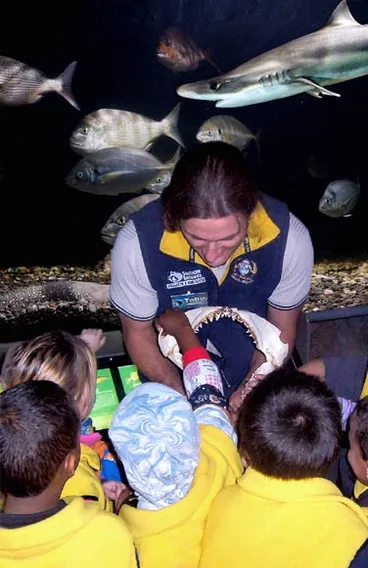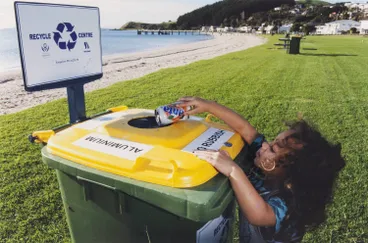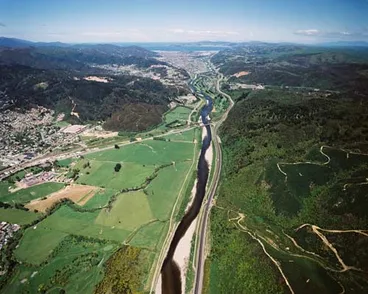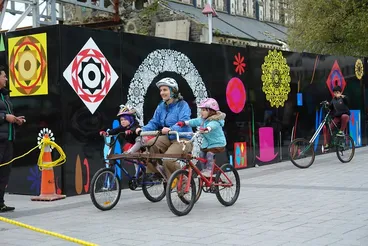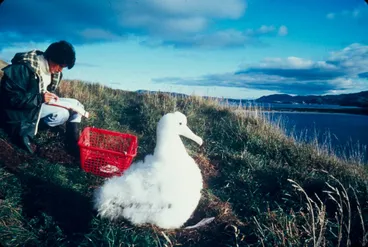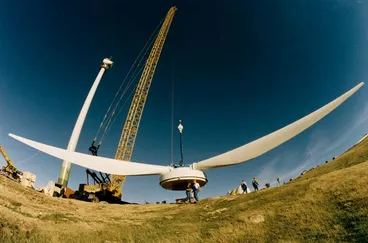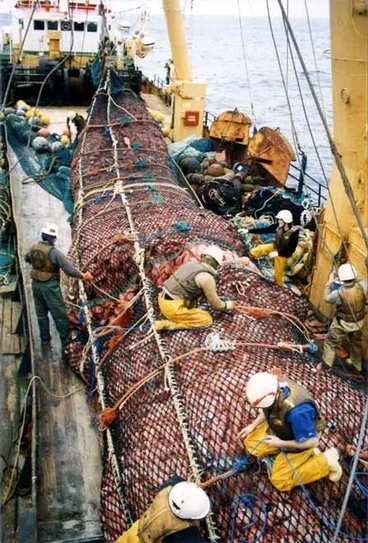Sustainability: Resources for Planning and Teaching
A DigitalNZ Story by National Library Services to Schools
This story links to resources to support teachers with planning for Education for Sustainability.
EOTC is an important part of learning about sustainability.
Manatū Taonga, the Ministry for Culture and Heritage
INTRODUCTION
This story provides resources for teachers in both primary and secondary schools who are planning to teach about sustainability. It is intended to compliment the other stories in our Sustainability topic.
CONTENTS
The resources from trusted sources are arranged as follows:
- Auckland region
- Waikato region
- Wellington region
- Canterbury region
- Otago region
- National resources
- Global resources
See the Ministry of Education site Pūtātara, a call to action. Incorporating sustainability and global citizenship, this resource supports schools and teachers to develop learning opportunities that are place-based, inquiry-led, and focused on participation for change.
Use the Department of Conservation Local Field Trips page to find opportunities for EOTC in your area, as well as resources to support these trips.
DOC also has the resource Exploring your local environment. Both resources support learning about and developing connections to local green spaces where sustainability can be explored.
Curious Minds - He Hihiri i te Mahara funds projects nationwide through the Participatory Science Platform and Unlocking Curious Minds contestable fund. Discover the fascinating range of projects schools and kura are involved in throughout the regions.
Papa Taiao Earthcare's mission is to support school’s to grow their capacity to deliver sustainability programmes. They specialise in creating unique learning experiences and are able to co-create a programme that works for your school.
Recycling and ensuring rubbish stays out of our oceans are important sustainable living practices.
Auckland Libraries
AUCKLAND REGION
Education for Sustainability— Auckland City Council resources for sustainability education, including professional development for teachers.
Live Lightly Noho Māmā — there are so many things you could do to live lightly, where do you start and how do you know what will make a real difference? Auckland City Council have come up with types of actions based on the highest possible impact and that are also practical and doable for people across Auckland.
Live Lightly Noho Māmā — tools, ideas and information to help make a difference and live sustainably at community, school, work and home.
Plant for your local ecosystem Te whakatipu i tāu ake pūnaha kaiao — Auckland City Council resources for planting in a range of ecosystems.
21 Day Challenge — Young Ocean Explorers challenge taking place during the led-up to the America's Cup in 2021. Students will be empowered to create a plan to make a difference to the Hauraki Gulf, or your local moana.
There are many opportunities to get involved in tree planting to help combat climate change and protect waterways.
Kete Horowhenua
WAIKATO REGION
Enviroschools— the Waikato Enviroschools programme is supported by Waikato Regional Council along with District and City councils.
Paper Industry — the waste from pulp and paper mills pollutes the water and air. Mill effluent goes into rivers, and can harm plants and animals. Today mills are trying to reduce environmental damage.
Sustainable use of an environment — this module includes a visit to a Dairy Farm where the farmer is milking fewer cows, working less and making a lot more money. He's also planted hundreds of trees, fenced off waterways, and drastically reduced his vet bills.
Wastewater education— Hamilton City Council conducts tours at our Wastewater Treatment Plant for interested groups of people. The tour will explain the water treatment processes and provide a general overview of Hamilton’s water supply.
Students can learn about Wellington's water supply and how to use it sustainably.
Manatū Taonga, the Ministry for Culture and Heritage
WELLINGTON REGION
Sustainable solutions for schools and teachers— get your students fired up about sustainability with one of Sustainability Trust's hands-on interactive curriculum-linked workshops either in your school or at their city EcoCentre. We can come to you, or we can hold it in our award-winning central city EcoCentre.
Turning on the tap — commissioned by the Greater Wellington Regional Council, Turning on the tap helps students to understand where their tap water comes from and make informed decisions about how they use it.
Take action for water — take action for water is a teacher-guided programme which consists of comprehensive teaching and learning resources.
Waste Education — Wellington City Council's Waste Education Officers help people to minimise waste and offer free schools visits.
Your Sustainable School — the Sustainability Trust can help you establish a student-driven waste minimisation culture in your school.
Using sustainable modes of transport is encouraged through various initiatives in Christchurch.
eqnz.chch.2010
CANTERBURY REGION
Education programmes — Environment Canterbury have an extensive range of programmes and resources have been developed by a team of educators to align with the New Zealand curriculum.
Village sustainability and management — Aoraki/Mount Cook village is a unique residential area situated within a national park. Students learn how DOC operates all the village services in line with its sustainable park management plan, including the award-winning water supply system, and see how a village can address the impact of human habitation on unique biological systems
Sustainable tourism operations have developed around Aotearoa, including the Royal Albatross Centre on Otago Peninsula.
Museum of New Zealand Te Papa Tongarewa
OTAGO REGION
Enviroschools — Enviroschools is a national programme delivered in partnership with local councils. It involves students taking action to create healthier, more peaceful and sustainable communities.
New Zealand Marine Education Centre — the Marine Studies Centre provides a window into marine research at the University of Otago. The Centre showcases local marine life and offers marine education programmes for all ages.
School travel plans — School travel planning is a programme that aims to improve road safety and reduce the number of vehicles driving to and from school. The programme works with primary, intermediate and secondary schools to encourage and increase the use of active travel modes to get to and from school.
Science Into Action — a range of community-driven projects are being funded by the Otago Participatory Science Platform. Discover how these projects are bringing kids, communities and scientists together.
Sustainability education— the Dunedin City Council supports and offers educational opportunities at certain times of the year on a number of different sustainability topics.
Town Belt Kaitiaki — Dunedin's Town Belt has become the setting for both conservation and education under a partnership involving students, teachers and the community.
New Zealand's first wind farm to generate sustainable energy was built in the Wairarapa in 1996.
Manatū Taonga, the Ministry for Culture and Heritage
NATIONAL RESOURCES
A sustainability project — resource from School Kit about testing the health of waterways.
Active travel action — this resource provides a process for schools to implement sustainable active travel practices in their school through student inquiry - and an opportunity for students to take action in response to climate change.
Aspects of sustainability - teacher resource — this New Zealand Curriculum guide for senior secondary schools discusses education for sustainability.
Building Sustainable Communities, level 5 — this unit examines the idea of communities' environmental and social sustainability, and the possible role of central and local governments in promoting sustainability, as well as the impact of individuals.
Citizen science — a range of citizen science projects that schools can engage with around Aotearoa.
Education for sustainability — a selection of programmes, tools and resources for teaching sustainability from the Ministry of Education.
Education for sustainability teaching and learning guide — a resource from the Ministry of Education, Education for sustainability (EfS) is about learning to think and act in ways that safeguard the well-being of people and the planet.
Education in Agriculture — NZ Young Farmers with support from CORE Education and funding from the Red Meat Profit Partnership have developed this website to support teachers and students to learn more about our land-based industries.
Environmental education for sustainability strategy and action plan — DOC strategy and action plan to better equip New Zealanders, especially children and young people, with the knowledge, skills and motivation to tackle environmental issues.
Enviroschools — the Enviroschools site has a wealth of stories from schools around Aotearoa that provide examples of taking action in our communities.
School-Gen for teachers — Genesis Energy & Mindlab Kids provide lesson plans, activities and online games to get students engaged in STEM learning.
Sustainable Coastlines — delivering inspiring events, behaviour-focused education and training to enable people to look after the places they love.
Sustainability — Science Learning Hub's collection of resources on sustainability.
Sustainability education programmes — Yachting New Zealand offer a sustainability education programme with a series of teaching resources aimed at young sailors.
Sustainable energy projects — this collection of videos on TKI highlights the teaching and learning about renewal resources that have taken place at Trident High School.
Sustainable New Zealand — The way forward - the last 50 years has seen a focus on cleaning up environmental messes.
Sustainable Seas: essential for New Zealand's health and wealth — resources from a LEARNZ field trip to Ōhiwa Harbour in the Bay of Plenty.
Sustainable recovery from COVID-19 — environmental groups from across New Zealand have written to the Prime Minister urging the Government to restore Aotearoa in the economic recovery after lockdown.
Young Ocean Explorers — connecting hearts and minds with the importance of enjoying and caring for our oceans, including tools to make a better future.
Developing sustainable fishing practices is a focus for many nations around the world.
Manatū Taonga, the Ministry for Culture and Heritage
GLOBAL RESOURCES
Climate change classroom activities — developed by the WWW, this new climate change resource offers students the opportunity to lead, ask questions and take action, all framed in a real-life context.
How to practise sustainability in schools — opportunities to practise ecological, social and economic sustainability in schools.
How to save our planet — an 8-minute film from WWF and Sir David Attenborough about how we take action for the future of our planet.
National Geographic Education sustainability resource library — an extensive body of resources that includes videos, articles and activities on a wide range of sustainability topics.
Our Planet, their future — this educators’ pack is designed to be used alongside the wealth of free videos and interactive tools on OurPlanet.com.
Sustainable development goals - resources for educators — this resource bank has been designed for educators, education planners and practitioners. It offers hundreds of pedagogical ideas for classroom activities and multimedia resources detailing how best to integrate ESD into teaching and learning, from early childhood care through secondary education.
Teach and learn about ocean sustainability — use these resources from the Marine Stewardship Council to discover how we can help keep our oceans healthy for generations to come.
WWW 50 actions for the Planet — the World Wildlife Fund list of sustainable actions.
This story was curated and compiled by Te Puna Mātauranga o Aotearoa | National Library of New Zealand, Services to Schools staff, June 2020.
